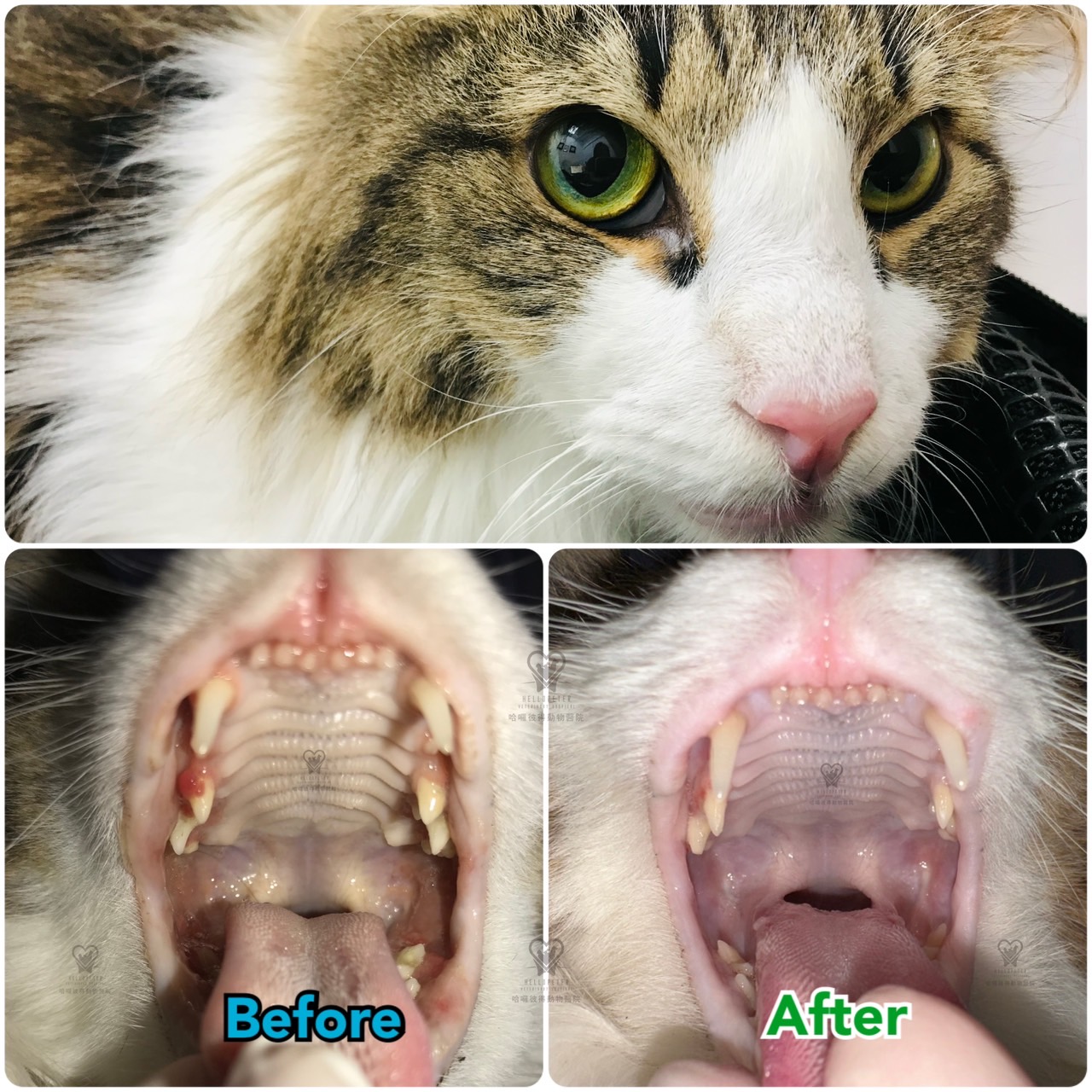【2024.02.21新增】沒有拔牙,以牙齦黏膜置換手術(MGRS)治癒的口炎母挪威森林貓

Midori是一隻已節育的母挪威森林貓,患有嚴重的貓慢性齒齦口炎 (feline chronic gingivostomatitis, FCGS),紅腫範圍從頰側的牙齦及口腔黏膜一路延伸到後口,口腔嚴重紅腫,雙側下顎第一臼齒(309、409)頰側因口炎併發咬合創傷(occlusal trauma)及創傷性肉芽腫(traumatic granuloma),疼痛導致Midori食慾嚴重受到影響。
先前Midori的口炎長期使用藥物控制,但逐漸出現耐受性,經台北的友院轉診,飼主帶貓來本院接受陳重威獸醫師獨創的牙齦黏膜置換手術 (Mucogingival Replacement Surgery, MGRS) 進行口炎 (FCGS)治療,開始治療時貓咪是3歲11個月,牙齦黏膜置換手術 (MGRS) 療程結束時4歲11個月。
經過1年的牙齦黏膜置換手術 (MGRS) 治療後,Midori的口炎 (FCGS) 完全治癒,陳重威獸醫師成功保住她所有的牙齒,沒有拔牙。Midori的體重從3.8kg上升至4.75kg,不需要打針吃藥,保持正常生活即可。
因為Midori同時也患有嚴重的牙周病(periodontal disease),雖然口炎 (FCGS) 順利治癒了,但還是需要每天刷牙及定期洗牙,保持良好的口腔衛生,才能確保口腔的健康。
感謝台北的友院轉介本病例來本院進行治療。
貓咪慢性齒齦口炎(FCGS)是常見的貓咪口腔疾病之一,常見的症狀為:
1. 牙齦及口腔黏膜紅腫,甚至潰瘍或增生,口腔所有軟組織,包含牙齦、兩頰舌頭兩側、舌頭下方、嘴角至咽喉部的口腔黏膜都會有紅腫潰瘍或增生。
2. 貓咪會因為口腔疼痛會減少進食,甚至不願意進食,或是吃飯喝水會不斷甩頭、使用前腳撥動嘴巴。
3. 口水因潰瘍多半都有異味,甚至帶有腐肉味。
目前普遍的治療多為施打長效型類固醇針劑或是口服類固醇藥劑,搭配抗生素,以及拔牙,但個體治療效果落差較大,且拔牙容易使貓咪口腔塌陷、齒槽骨萎縮,貓咪需要終生服用藥物,無法斷藥。
陳重威獸醫師獨創的牙齦黏膜置換手術 (Mucogingival Replacement Surgery, MGRS)便是希望可以克服上述口炎治療的後遺症及困境,讓患有FCGS的貓咪痊癒後不必長期吃藥,可以恢復病前的正常生活。
其基礎理論是讓疤痕組織及膠原蛋白取代原本貓咪口炎的紅腫部位,陳重威醫師擁有豐富的臨床經驗及獨特的醫療技術,可以讓疤痕組織不會出現延展困難的問題,因此治癒好的口炎貓咪得以維持完好的口腔功能,且完全治癒口炎。
想看更多本院以牙齦黏膜置換手術 (Mucogingival Replacement Surgery, MGRS) 治癒好的貓咪個案,請參考官網的【MGRS治療貓口炎個案】專區(www.hellopeter.com.tw/contents-4.html)或FB粉專專屬相簿(www.facebook.com/media/set/?set=a.1308046286294231&type=3)
*特別提醒:牙齦黏膜置換手術 (Mucogingival Replacement Surgery, MGRS) 是陳重威獸醫師全球首創且獨創的治療動物口炎和口腔軟組織的外科技術。
此技術從未在其他場合公開或傳授給他人。
*若您在其他地方聽到或看到任何聲稱使用牙齦黏膜置換手術或類似文句,引導治療狗貓口炎的訊息或文宣,請注意,這些宣稱與陳重威獸醫師的研究和研發術式毫無關聯,切勿輕信。
感謝您的理解與合作。
[Added on 2024.02.21] Mucogingival Replacement Surgery (MGRS) successfully treated feline chronic gingivostomatitis (FCGS) in a Norwegian Forest Cat without tooth extraction.
*Special Reminder: Mucogingival Replacement Surgery (MGRS) is a pioneering and innovative surgical technique for treating stomatitis and oral soft tissue in animals, developed globally by Dr. Chung-Wei Chen. This technique has never been publicly disclosed or taught to others. If you hear or see any messages or promotional materials elsewhere claiming "the use of MGRS to treat stomatitis in dogs and cats," please be aware that these claims have no association with the research and development techniques of Dr. Chung-Wei Chen. Please do not believe in them. Thank you for your understanding and cooperation.
"Midori" is a spayed female Norwegian Forest Cat suffering from severe Feline Chronic Gingivostomatitis (FCGS). The inflammation extends from the gingiva and oral mucosa on the buccal side to the caudal oral cavity, causing severe swelling in the oral cavity. The bilateral mandibular first molars (309, 409) on the buccal side exhibit inflammation, occlusal trauma, and traumatic granuloma due to concurrent oral inflammation, leading to significant pain and a severe impact on Midori's appetite. Midori had previously been using medications to control the oral inflammation, but tolerance gradually developed. Referred by a animal hospital in Taipei, the owner brought Midori to our hospital for treatment using Dr. Chung-Wei Chen's unique Mucogingival Replacement Surgery (MGRS) for FCGS. At the start of treatment, Midori was 3 years and 11 months old, and the MGRS treatment concluded when she was 4 years and 11 months old.
After a year of MGRS treatment, Midori's FCGS completely healed, and Dr. Chung-Wei Chen successfully preserved all her teeth without extraction. Midori's weight increased from 3.8 kg to 4.75 kg, and she can now lead a normal life without the need for injections or medications. Despite the successful resolution of FCGS, Midori also suffered from severe periodontal disease, requiring daily tooth brushing and regular dental scaling to maintain good oral hygiene and ensure overall oral health.
Thanks to the animal hospital in Taipei for referring this case to our hospital for treatment.
Feline chronic gingivostomatitis (FCGS) is one of the common oral diseases in cats. The main symptoms are:
1. The gingiva and oral mucosa are red, swollen, ulcers or hyperplasia. All soft tissues in the mouth, including the gingiva and all parts of the oral mucosa (including buccal, lingual, sublingual and oropharynx, etc.), will have redness, ulceration or hyperplasia.
2. Cats will lose their appetite or even refuse to eat because of mouth pain, or they will keep shaking their heads and scratching their mouths with their front feet when eating and drinking.
3. The patient's saliva usually has a peculiar smell, even putrefactive odor, due to ulcers.
At present, the most common treatments are long-acting steroid injections or oral steroids, combined with antibiotics, and tooth extraction, etc., but the effect of individual treatment varies greatly, furthermore, tooth extraction will likely cause the cat's oral cavity to collapse and alveolar bone loss. They need lifelong medication and can't stop it.
Dr. Chung-Wei Chen's original Mucogingival Replacement Surgery (MGRS) aims to solve the above-mentioned sequelae and difficulties in the treatment of stomatitis, and make cats with FCGS no longer need to take medicine for a long time after recovery, and return to the normal life they had before the illness.
If you want to see more cat patients cured by MGRS in our hospital, please refer to our official website (
www.hellopeter.com.tw/contents-4. html) or Facebook fan page album (
www.facebook.com/media/set/?set=a.1308046286294231&type=3).
#
陳重威獸醫師 #
狗貓植牙 #
hellpeterveterinaryhospital #
動物牙科推薦 #
寵物牙科推薦 #
牙齦黏膜置換手術 #
貓口炎治療 #
mgrs #
貓慢性齒齦口炎 #
mucogingivalreplacementsurger #
貓口炎專家 #
貓口炎權威
#
貓 #
貓牙周病 #
口炎貓 #
牙周病治療 #
cat #
dog #
貓口炎醫生 #
貓口炎醫師
#
動物口腔外科 #
獸醫牙科推薦 #
pet #
動物植牙手術 #
牙科獸醫推薦 #
台中動物醫院 #
台中動物醫院推薦
#
植牙獸醫 #
植牙獸醫推薦 #
阿威獸醫師的開口啟齒 #
動物植牙 #
狗貓植牙推薦 #
寵物植牙



